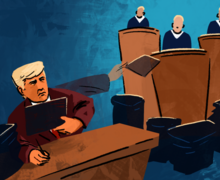Hiroshima survivor recounts bombing, speaks out against nuclear proliferation at Syracuse University lecture
Daily Orange File Photo
Keiko Ogura, a survivor of the atomic bombing of Hiroshima, described her experience living after the bomb decimated her home city.
When Keiko Ogura introduces herself as an atomic bombing survivor, she does so with a smile and reassuring warmth. Ogura, the Hiroshima Peace Culture Foundation’s official English language storyteller, has spent the later part of her life recounting the events that transpired on Aug. 6, 1945.
Ogura — who addressed about 150 campus community members at Gifford Auditorium Monday night as part of a Syracuse University lecture series — was an 8-years-old when the bombing occurred. She still remembers that day clearly, though.
At the event, she recalled her experiences in Hiroshima and addressed concerns raised by audience members about President Donald Trump’s stance on nuclear proliferation.
The Ogura family largely escaped the Hiroshima bomb’s massive destruction, possibly due to a premonition from her father, she said. An air raid warning had been issued a day before, but on the morning of Aug. 6, 1945, Hiroshima was relatively calm, she said.
“All of a sudden my father said ‘Keiko, you shouldn’t go to school today,’” Ogura said. When she argued with him, the elder Ogura replied, “Today something might happen. I have a bad feeling.”
The family took shelter in a nearby bunker. That’s where they were when the bomb dropped. Keiko described a piercing silence that overtook the city. Then, in the next moment, a violent conclusive force.
“All of a sudden there was a flash … the flash was tremendously white. All of a sudden everything turned to white, I couldn’t see every color,” Ogura said. “I was beaten on the ground, (and) at the same time, the blackness came on me and I became unconscious.”
When she regained consciousness, Ogura saw unimaginable horrors surrounding the shelter, she said, including people on fire, a decimated cityscape and a river full of dead and burning bodies. Ogura felt an overwhelming sense of hopelessness, she said.
People wanted to kill themselves, they were so hopeless, Ogura said. She wanted to help but was only a child.
Now, though, Ogura has set her sights on preventing similar events from taking place, which she said are possible in light of recent comments made by Trump, to whom she pleads patience, she said. The government of her home country, Japan, recently described the North Korean nuclear threat as “imminent,” Newsweek reported.
“We cannot use a single bomb to destroy everything,” Ogura said. “We pray that President Trump shouldn’t react so quickly. He should wait.”
Echoing Ogura’s sentiments, Diane Swords of the Syracuse Peace Council asked attendees of the event to sign a petition calling for central New York senators and representatives to support a bill that aims to restrict the president’s ability to launch nuclear weapons.
Swords said the group has already collected more than 1,000 signatures and is aiming for another 1,000 signatures by November. The petition will be submitted to Rep. John Katko (R-Syracuse) and New York Sens. Kirsten Gillibrand and Chuck Schumer.
Joan Burstyn, a professor emerita of history and education at SU, said the potential biological impacts of nuclear warfare are particularly dangerous.
“Nuclear weapons may affect the DNA of the individual and could carry through into future generations. This is what is so vicious about nuclear weapons,” Burstyn said. “We are talking about something that can change the way that humans are developing and what will occur in future generations.”
Near the end of the event, Ogura briefly reflected on the privilege she has as a survivor, in comparison to peers who perished that August morning decades ago.
“Now I live like this,” Ogura said. “I know the meaning to survive.”
Published on October 24, 2017 at 12:32 am
Contact Ryan: rarozenb@syr.edu





